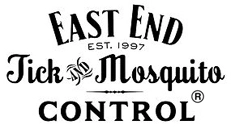The Origin of the Asian Tiger Mosquito on Long Island
You may have recently seen a new type of mosquito here on Long Island. It is black, with white stripes on its body and legs. This is the Asian Tiger Mosquito or Aedes albopictus. This mosquito is an invasive species to Long Island. The story of the Asian Tiger Mosquito on Long Island and America as a whole oddly begins with a stack of used tires in Japan.
Mosquitoes are very hardy creatures and adept at using even the smallest amounts of water to breed in. When outdoors, tires can collect rainwater on their inside which happens to be just enough for a mosquito to breed in. In 1985 a stack of used tires was shipped to Houston, Texas from Japan. These tires, unfortunately, held the eggs of the native to Japan, Asian Tiger Mosquito. Once they got to the United States, these eggs hatched and the mosquitoes spread throughout the United States. Many experts now consider this mosquito the most invasive in the world. This mosquito took until 2004 to reach Suffolk County, but it’s been a perennial pest ever since.
Asian Tiger Mosquito Differences
Mosquitoes have always been on Long Island though, so what makes this mosquito different than the other pests that harass the residents of Long Island? Aside from the odd patterns on their body, the main difference between Asian Tiger Mosquitoes and the mosquitoes native to Long Island is their behavior. According to Science of Us, Asian Tiger Mosquitoes are known to be much more aggressive than the native mosquitoes. While native mosquitoes are often in and out without a trace, taking measures to be as stealthy as possible Asian Tiger Mosquitoes will linger and persist until they get what they want. Not only are these mosquitoes more aggressive than the native ones, but they are also active more often than the native species. Asian Tiger Mosquitoes have been found harassing people in the day as well as the evening.
Diseases Carried by the Asian Tiger Mosquito
Mosquitoes have long been known for being vectors for a wide variety of diseases. The Asian Tiger Mosquito is unfortunately no different than its native counterpart in its part in disease spreading. The Asian Tiger Mosquito has the potential to play host to a variety of the diseases mosquitoes have been known to carry including Zika. Other diseases this mosquito is known to carry is yellow fever and dengue fever. These mosquitoes can also be vectors for heartworms that affect dogs and cats.
How to Protect Yourself from the Asian Tiger Mosquito
Asian Tiger Mosquitoes can be deterred by the same mosquito repellants that work on native species. One of the best things you can do to defend your family, pets, and property from this pest is getting a mosquito spray for mosquito control from East End Tick & Mosquito Control®. Our sprays eliminate Asian Tiger Mosquitoes along with the native mosquitoes on your property along with all the other native mosquitoes. Apart from that, take actions to ensure that as little standing water as possible is on your property. Any object that collects standing water should be kept to where the rain water cannot get to them and mosquitoes cannot breed in.
If you have spot Asian Tiger mosquitos on your property or wish to schedule a preventative yard spray, give the experts at East End Tick & Mosquito Control® a call today. For those living near Southampton, please call (631) 287-9700. If you are closer to East Hampton, please call (631) 324-9700. And if you reside near Southold, please call (631) 765-9700. You can always email us as well. We look forward to hearing from you!


